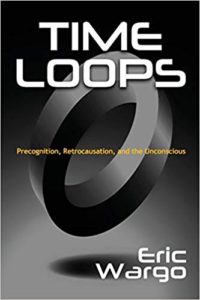Werewords
As a Wargo, descended from the Eastern European hinterlands, home of the original Indo-European culture from which all European languages (as well as Sanskrit) derived, I am naturally drawn to the wer- family of words—one of the main word families of that ancient language, with descendents still in the Slavic, Germanic, and Latin tongues. The wer- family (actually a few related word groups having in common this w followed closely or immediately by an r) is the backbone of English, and if English is viewed not just as a tongue but as a philosophy, the wer- words contain its fundamental intuitions about man and his place in the cosmos. I sort of think of the wer- words as the soul of the Old English worldview.
My favorite of this vast and important family, and a good starting point for any tour of the Anglo-Saxon (AS) tongue, is wyrd, the AS word for “fate.” It survives now in the wonderful word weird, thanks partly I suppose to Shakespeare’s Macbeth. The “weird sisters” in Macbeth were prophetic witches, but they derived mythologically from the three norns, sister-goddesses in Norse mythology who together wove a man’s destiny and could thus foretell it: Urd or Wyrd (the “ur-norn” or norn of the past) spun the yarn or thread of a man’s life, Werthandi (the norn of the present) took the measure of this yarn in the present (think “worth”), and Sculd (“should,” the norn of the future) represented that which was yet to pass, the world in which we pay our debts, fulfill our obligations, and die. (Sculd cut the yarn of a man’s life after Werthandi had measured it out.)
Wyrd comes from the AS word weorthan, “to become,” which in turn came from the Indo-European root wer-, meaning to turn or spin (hence the “spinning” of the yarn of our life). Although it is usually translated as “fate” or “destiny,” those Latinate words imply a predetermination that is not present in wyrd. Rather, wyrd, as becoming and as turning, really represents “what has turned out” or “what will have turned out” as well as “what you are turning into” or “what you will have turned into.” There is definitely a sense of a man working (from AS wyrcan, “to do”) with his wyrd to weave his future—working actively with the strands of his past life to make something new of it, to become something else.
Because of its sense of turning, weorthan connotes direction. Our suffix -ward, as in toward, inward, backward, upward, and so, on comes from -weard. (In AS, andweard meant the present, and froweard, the future.) The AS root weardan is derived from a different Indo-European wer- cluster that has to do with watching, seeing, and guarding, but the sense of direction is often there—as in guarding (warding) or looking in a certain direction. From this root we get aware and wary, ward (from weard, keeper) and warden, as well as award and reward and wares (things that are guarded or watched). Rearward, interestingly, originally meant “rear-guard” (not “toward the rear”). (Guard, in itself, is an interesting story—see below.)
The sense of turning or bending in the wer- family of words also creates a cluster of interesting words to do with the pitfalls of emotion and destiny. There is writhe, to twist/turn (AS writhan), which may produce a wreath, or if it is a person, a wraith—a twisted and anguished soul, or even an undead spectre. If you twist something (like a towel or a neck), you wring it. And a ring, AS hring, is like a turning, or wreath, of metal. The state of being tortured or twisted in anger is wrath, or wroth. Worry comes from wyrgan, to strangle. There is also wrangeln, “to wrestle,” from which we get wrangle. And if you are turned aside from the straight and narrow—the riht (“right”)—then you are wrong (wrang). There are a host of other English words that have this ‘bendy, twisty’ connotation: wrinkle, wrench, wrap, warp, and worm (from AS wyrm), to name a few.
Wrecan (“to inflict, or punish”), whence wreak, is related to weorthan, and is the source of the words wretch (which meant an exile or someone punished) and wretched. Some of wrecan’s descendents have a ‘twisted’ or ‘crumpled’ connotation, as though they have been conflated with the descendents of weorthan over the centuries. Words like wreck. There is also wrought, a word that is often confused as a past tense of wreak, but is actually an alternate to worked, past tense of work, from the AS wyrcan, “to do”—which also gives us a wright, a craftsman or producer of something, like a playwright or a cartwright (a maker of carts).
Turning connotes change, so wer- words are to be found in ideas like worth, which meant what something has turned or changed into—which in the realm of commerce means what or how much a thing can be traded or exchanged for, hence our modern, monetary sense of the word—and worthy. There is also stalwart (“steadfast”), which combines –wart with stathol (“foundation”). Note that wort, as in St. John’s Wort, meant plant (whence we get root), and derives from a different Indo-European root, wyrt, but one with obvious resonances in the whole group of wer- words, with their twists and turns and bends, as well as their veerings (veer is also from wer-, but via the French -vert, equivalent of -ward—think words like vertical or introvert). To root (as in rummage or “root around in the dirt”) came from the AS verb wrotan.
There are also a number of wer- words that have somewhat separate genealogies etymologically but are related philosophically.
Importantly, there is write, which is usually considered to derive from writan, which means to cut or mark or scratch, but which could just as easily (to my mind) come from weorthan in the sense that writing is a turning, not only of lines/letters, but also of turning out. You have only to think of the elaborately wrought Lindisfarne Gospels to see writing as something that twists and turns upon itself—something wrought as well as writhed. And there is of course word, which also has slightly different roots etymologically but ‘goes with’ this whole family of things that turn, or which we turn, and which can be written.
My other favorite ‘other’ wer- word is, well, wer, which meant “man.” Wer has its echoes in the Latinate vir (man) and its derivatives virile (manly) and virtue. But the AS wer only survives in two places in modern English. One is the word werewolf (literally “man-wolf”), a verbal echo of a time when the world was full of shape-changers, or things that turned into other things. The other hiding place of the AS wer is all around us: the world. In AS, this was weorold or “age of man” (wer+old or eld, whence elder). The world in this sense was not the spatial world we think of nowadays, but the temporal, finite time during which men walk upon the eorth, before the end of days (the Norse Ragnarok, or the Christian domesdaeg, the day of doom or “judgment”).
This brings us to the gr-words. The spatial sense of the modern English world was expressed by the AS word middangeard, which J.R.R. Tolkien famously translated as “middle earth” but is more literally translated as “middle enclosure.” Geard, whence yard, once meant any enclosed or walled area, ranging from a fort—something guarded—to the whole inhabited world as a kind of vast enclosure. It is related to the AS verb gyrdan, which meant to encircle or surround, and gives us the modern words gird (as in “gird your loins”), girt, and girdle (from AS gyrdel).
Geard/yard assumed diminished, increasingly domestic meaning over the centuries, and now tends just to mean the grounds attached to a house; it is related to the French jardin, whence the modern English garden. Orchard comes from AS orceard, thought to be an alteration of ortgeard or wyrt-geard—an enclosure for cultivating plants. But the old sense of geard as a vast encircled enclosure is also related to the modern English horizon, which comes (via French) from Greek horizein, “to limit/encircle,” from horos, meaning boundary.
Surely horos must be connected with the Greek hora, meaning time (whence we get words like hour, horoscope, etc.). In the same way, geard, the enclosure of the world, must connect to the AS gear, whence year. The seasons, of course, were marked by where the sun fell on the horizon, so a connection between the ideas of the horizon and cyclical time would have been a natural one to make in the geardagum, the “olden days” or days of yore (from AS geara). What about linear time? Perhaps it is a reach, but gearn (“string”), whence yarn, is what the norns spun, measured, and cut, symbolic of a man’s finite life and wyrd.
The word great, meaning large in size, I connect with the horizon too. Because it is the horizon that gives us our sense of scale. Something great is, to me, something that stands tall against the horizon, or that might even rise up from beyond it.
And what about yearning, from AS giernan or gyrnan? To yearn is to long or desire something in a kind of extreme, painful or melancholy way, to regret the loss of something. One yearns for what has, indeed, passed far away, as beyond the horizon, out of one’s geard.



